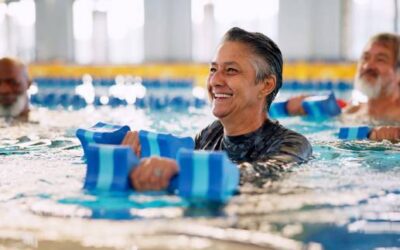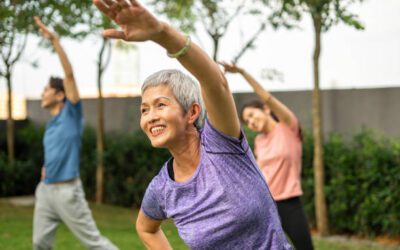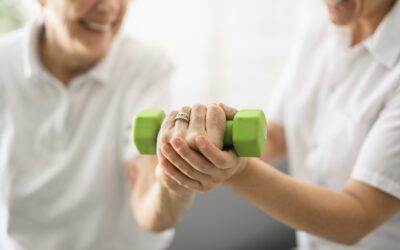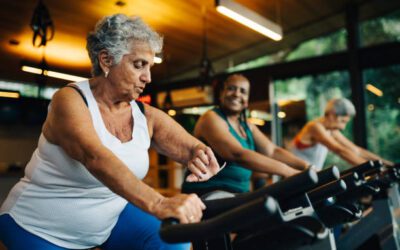BLOG
Most Popular Posts
The Power of Hydrotherapy for Aging Joints and Muscles
As adults enter their later years, the natural wear on joints and muscles becomes more pronounced. Cartilage thins, flexibility declines, and conditions such as osteoarthritis, chronic back pain, and muscle stiffness begin to affect day-to-day comfort. Hydrotherapy has emerged as a gentle yet highly effective approach to easing these age-related changes. Using warm water, buoyancy, and controlled movement, it creates an environment where the body can move with less strain and significantly more comfort.
How Physical Therapy Helps with Chronic Back Pain in Seniors
Chronic back pain is one of the most frequent complaints among older adults, affecting mobility, independence, and overall quality of life. As the spine undergoes natural age-related changes—such as disc degeneration, reduced muscle elasticity, and joint wear—seniors often experience stiffness, inflammation, and persistent discomfort. These issues can escalate when combined with sedentary habits, weakened core strength, or previous injuries.
The Importance of Vitamin D & Calcium for Aging Bones
As people grow older, maintaining bone health becomes a critical part of preserving mobility, independence, and overall quality of life. Aging bones naturally lose density over time, increasing the risk of fractures, osteoporosis, and long recovery periods after injury.
The Benefits of Physical Therapy for Aging Bodies
Aging brings natural changes to the body, including reduced muscle mass, joint stiffness, balance challenges, and slower recovery from injury. While these changes are expected, they do not have to lead to loss of independence or diminished quality of life. Physical therapy plays a critical role in helping older adults maintain mobility, manage pain, and stay active in a safe, structured way. Rather than focusing only on recovery after injury, physical therapy for aging bodies is increasingly viewed as a proactive approach to long-term health and functional longevity.
Best Stretches for Seniors to Maintain Flexibility
Staying flexible is one of the simplest yet most powerful ways for seniors to preserve independence, reduce pain, and improve quality of life. As we age, muscles naturally lose elasticity, joints stiffen, and balance may decline. Regular stretching counteracts these changes, promoting mobility and preventing injuries that often come from sudden movements or falls.
Exploring the Primary Source of Pain Among Individuals Aged 65 and Over
As the global population continues to age, it's becoming increasingly important to understand the health issues that affect seniors. Chronic pain is one of the most common and impactful issues among older individuals. It's something that affects a significant...
Understanding the Benefits of Massage Therapy for Senior Well-Being
As we age, our bodies undergo numerous changes that can impact mobility, comfort, and overall health. Stiff joints, muscle tension, and chronic pain become more common, making it difficult to maintain an active lifestyle. This is where massage therapy plays a crucial role in promoting well-being among seniors. More than just a luxury, massage therapy is a therapeutic approach that offers significant physical, emotional, and mental benefits.
Why Regular Physical Therapy Appointments Are Essential for Seniors
As individuals age, the body naturally undergoes physical changes—muscle mass decreases, balance may waver, and flexibility tends to decline. These changes can make everyday tasks more difficult and increase the risk of falls or injuries. Regular physical therapy appointments help address these challenges proactively. For seniors, physical therapy is not just a treatment after an injury; it’s a preventive measure that sustains independence, mobility, and confidence.
What Families Need to Know About Speech Therapy for Seniors
Speech therapy is often associated with children learning to communicate, yet its role in senior care is equally vital. Aging brings natural changes in cognitive processing, muscle strength, and swallowing function. When a senior begins to struggle with speaking clearly, remembering words, or safely swallowing food, the impact reaches far beyond communication. It affects independence, safety, social engagement, and emotional well-being.
The Benefits of Cycling for Senior Fitness
As people age, maintaining physical health becomes more than just a lifestyle choice—it becomes a cornerstone of independence, mobility, and emotional well-being. Among the many forms of exercise available, cycling has emerged as a standout option for seniors looking to stay fit, energetic, and mentally sharp. Whether outdoors on a scenic trail or indoors on a stationary bike, cycling offers a low-impact, high-reward experience tailored to aging bodies.









